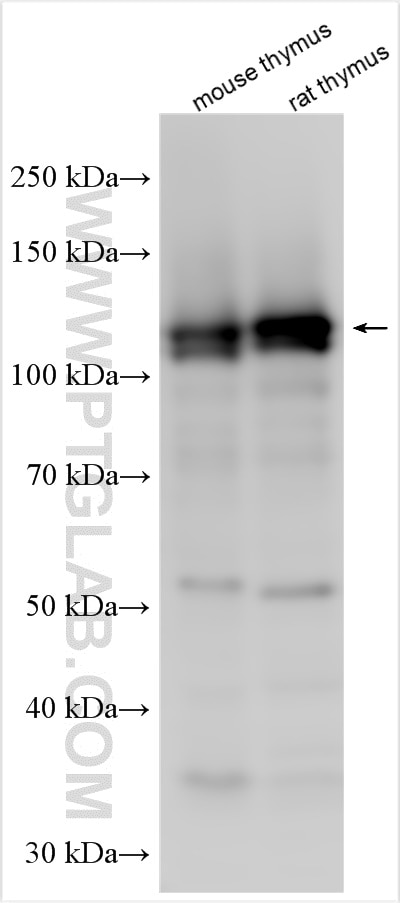Anticorps Polyclonal de lapin anti-RAG1
RAG1 Polyclonal Antibody for WB, ELISA
Hôte / Isotype
Lapin / IgG
Réactivité testée
Humain, rat, souris
Applications
WB, ELISA
Conjugaison
Non conjugué
N° de cat : 20977-1-AP
Synonymes
Galerie de données de validation
Applications testées
| Résultats positifs en WB | tissu de thymus de souris, tissu de thymus de rat |
Dilution recommandée
| Application | Dilution |
|---|---|
| Western Blot (WB) | WB : 1:500-1:2000 |
| It is recommended that this reagent should be titrated in each testing system to obtain optimal results. | |
| Sample-dependent, check data in validation data gallery | |
Informations sur le produit
20977-1-AP cible RAG1 dans les applications de WB, ELISA et montre une réactivité avec des échantillons Humain, rat, souris
| Réactivité | Humain, rat, souris |
| Hôte / Isotype | Lapin / IgG |
| Clonalité | Polyclonal |
| Type | Anticorps |
| Immunogène | Peptide |
| Nom complet | recombination activating gene 1 |
| Masse moléculaire calculée | 119 kDa |
| Poids moléculaire observé | 110-120 kDa |
| Numéro d’acquisition GenBank | NM_000448 |
| Symbole du gène | RAG1 |
| Identification du gène (NCBI) | 5896 |
| Conjugaison | Non conjugué |
| Forme | Liquide |
| Méthode de purification | Purification par affinité contre l'antigène |
| Tampon de stockage | PBS avec azoture de sodium à 0,02 % et glycérol à 50 % pH 7,3 |
| Conditions de stockage | Stocker à -20°C. Stable pendant un an après l'expédition. L'aliquotage n'est pas nécessaire pour le stockage à -20oC Les 20ul contiennent 0,1% de BSA. |
Informations générales
Recombination-activating gene (RAG) proteins include RAG1 and RAG2, which are crucial for Ig and T lymphocyte receptor (TCR) fragment rearrangement and are responsible for DNA recognition and cleavage at specific sequences. Mutations in RAG1 result in the complete or partial loss of recombinant enzyme activity, in unbalanced variable-diversity-joining (V(D)J) recombination, and in the impairment of T and B lymphocyte development at the early stages.
Protocole
| Product Specific Protocols | |
|---|---|
| WB protocol for RAG1 antibody 20977-1-AP | Download protocol |
| Standard Protocols | |
|---|---|
| Click here to view our Standard Protocols |


